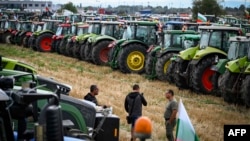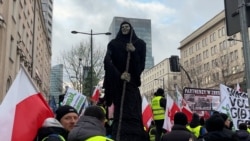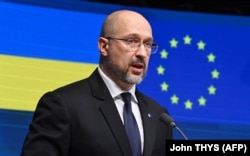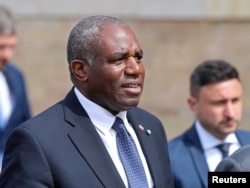Welcome to Wider Europe, RFE/RL's newsletter focusing on the key issues concerning the European Union, NATO, and other institutions and their relationships with the Western Balkans and Europe's Eastern neighborhoods.
I'm RFE/RL Europe Editor Rikard Jozwiak, and this week I'm drilling down on two issues: Why EU and Ukraine trade will be less free going forward and an upcoming flurry of important meetings in Lviv and Warsaw.
Briefing #1: Why EU-Ukraine Trade Is About To Get Less Free
What You Need To Know: Since June 2022, the European Union has granted Ukraine full trade liberalization to help support the war-torn country's economy. These measures -- suspending import duties and quotas -- are known as Autonomous Trade Measures (ATMs), and they appear to have benefited Kyiv.
In 2024, Ukrainian exports to the EU reached nearly 60 percent of total exports, up from 39.1 percent in 2021. However, the ATMs, which have been renewed annually by a majority vote of EU member states, are set to end definitively on June 5. They were always intended to be temporary and could only be extended twice.
Now, negotiations are under way between Brussels and Kyiv on what will replace them.
The fallback option is a return to the EU-Ukraine Association Agreement , which came into force in 2017 (though provisionally applied from 2016), and includes a free trade component.
The current talks focus on Article 29 of that agreement, which outlines a framework for potential reciprocal tariff liberalization.
But it is far from smooth sailing, as time is running short, and the effects of the ATMs aren't universally liked in the bloc.
Deep Background: Farmers in so-called frontline EU border states, such as Poland, Slovakia, Hungary, Romania, and Bulgaria, have long lobbied their governments to get rid of them, arguing that a glut of Ukrainian agricultural goods has overwhelmed local storage and pushed down prices for local food producers.
At various times in 2023 and 2024, these farmers blocked the borders with Ukraine to prevent goods from entering the EU. In response, the European Commission, which oversees EU trade policies, tried several solutions, including sealing agricultural shipments from Ukraine to divert them away from frontline countries and toward other EU destinations or ports for export beyond the bloc.
In the end, the commission agreed to limit inflows of the most popular agricultural goods by enacting emergency brakes. These brakes could be pulled if certain imports exceeded the average import numbers recorded between July 1, 2021, and December 31, 2024. And the brakes have been used readily in the past year on Ukrainian exports of oats, eggs, sugar, and honey.
The official line of the European Commission is that it is "finalizing the work on the proposal to ensure a seamless transition to a new trade regime with Ukraine after the expiry of the ATMs" and that this proposal will soon be presented to Kyiv.
The question is when. Many EU officials in Brussels are worried that any new proposal could become a political hot potato in the Polish presidential election campaign when the country goes to the polls to select a new head of state on May 18, and a likely second round on June 1.
But it is not only the political sway of Polish farmers that needs to be heeded.
A joint letter by the agriculture ministers of Bulgaria, Hungary, Romania, and Slovakia addressed to the European Commission and seen by RFE/RL has also raised the stakes.
The letter states that the ministers "firmly believe that the upcoming expiration of the ATM regime must serve as an opportunity to reassess and recalibrate our trade relations with Ukraine. It is essential to ensure that future trade arrangements reflect a balanced approach that accommodates the interests of all parties without disproportionately harming the economies of neighboring member states."
It then goes on to highlight several new proposals, all of which would be disadvantageous to Kyiv.
These include:
- A return to prewar tariff quotas;
- Bilateral safeguard provisions for all agricultural products;
- Frontline member states being able to impose extra safeguards; and
- A review clause to reassess the agreement two years after its application -- aimed at preventing future market distortions and ensuring fair competition for EU farmers.
But it doesn't end there.
The ministers also argue that "in parallel with Ukraine's accession process, relevant sanitary and phytosanitary, animal welfare, public health, and environment-related regulations in line with EU standards should be introduced for Ukrainian agricultural production."
Drilling Down
- While such reforms are indeed necessary for eventual EU membership, it's notable that one of the letter's signatories, Hungary, is currently blocking that very accession process.
- The ministers also propose a minimum import price threshold for selected items, which "could play a deterrent role in terms of importing agricultural goods into EU Member States at prices below the cost of domestically produced agricultural products" -- effectively another trade barrier and a clear move to shield local farmers.
- So, what does Ukraine want? Simply put, almost more of the same. In a letter to the commission, seen by RFE/RL, Ukrainian Prime Minister Denys Shmyhal writes that, "without substantial guaranteed and ongoing multi-industry trade liberalization, Ukraine will simply be unable to rebuild its industries, create jobs and livelihoods for its citizens to recover its economy. Simply put, Ukraine needs your trade. First to survive, then to thrive."
- Shmyhal also warns that, failing to strike a preferential trade deal with Brussels could cost Ukraine €3 billion ($3.4 billion) annually, potentially leading to a 1 percent reduction in Ukraine's gross domestic product.
- While accepting that any new deal is likely to come under the EU-Ukraine Association Agreement, Shmyhal says that it should "contain a minimum number of exceptions" and points out that "we are obviously aware of concerns of European farmers, but we emphasize that the share of Ukrainian products on the European market remains relatively small. For many product groups, even those considered sensitive, it's less than 1 percent of total EU consumption."
- He also suggests that the safeguard measures introduced for certain products in 2024 "should become the starting point for gradually liberalized tariff quotas" on agricultural goods.
- Given the looming June 5 deadline, Shmyhal has also hinted at some sort of bridging solution -- something that I have heard might happen.
- "If it is impossible to reach a solution in time before the 5th of June, we need to find a joint short-term solution so current Ukrainian exports can continue until the Association Agreement is updated," he said.
- "Otherwise, there is a risk of returning to higher tariffs and lower quantities under the tariff quotas of the prewar period, and this would cause significant damages to the Ukrainian economy."
Briefing #2: Sanctions, War Tribunal On Agenda As EU Ministers Prepare To Meet
What You Need To Know: European Union foreign ministers will gather in Warsaw this week for an informal council meeting and then head to Lviv in a show of solidarity with Ukraine in the face of major Victory Day celebrations in Russia.
Few concrete decisions are expected be made in either Poland on May 7-8, nor a day later in the western Ukrainian city of Lviv, as these aren’t official EU councils.
“In line with the meeting's informal nature and taking benefit from the more intimate (ministers-only) setting, we encourage everyone's contribution to a truly frank and non-scripted discussion," according to a welcoming note for the Warsaw meeting that was seen by Radio Free Europe/Radio Liberty.
"In this spirit, we recommend that our working sessions take place without interpretation or electronic devices. We also kindly invite you to opt for semi-formal attire throughout the meeting.”
The informality doesn't mean the meetings will lack high-level officials and come at a time when Russian President Vladimir Putin is looking to capture the world's attention with a massive military parade in front of dozens of dignitaries from around the world.
During the first day of the Warsaw meeting, UK Foreign Secretary David Lammy will join to discuss European security, while the second day is dedicated to EU-US relations and the situation in Ukraine.
On the latter, the welcome note, signed by the EU foreign policy chief Kaja Kallas and the host, Polish Foreign Minister Radek Sikorski, proposes an "in-depth discussion" on the EU's role in bolstering Ukraine's negotiation position toward a "just and lasting peace."
Officials will look to do this, the note says, by "building on our unique collective leverage -- broad support to Ukraine, in particular financial and military, pressure to constrain Russia's war chest, Ukraine's EU accession path, and the ongoing work on enhancing European defense capabilities.”
Deep Background: While no decisions are to be rubber stamped, there are three developments pertaining to Ukraine that analysts said will be closely watched.
The EU is aiming to announce more cash for Ukraine's defense industry, though a figure has yet to be agreed.
The bloc is also expected to accelerate sanctions on Russia in the wake of numerous missile and drone attacks on Ukrainian cities in recent weeks.
According to EU diplomats, it is likely to be a smaller package consisting mainly of the further blacklisting of Russian officers and politicians along with adding ships belonging to the Russian shadow fleet that will be banned from getting services in European ports.
Drilling Down
- Major new economic sanctions against Russia aren't expected to avoid dissent from some EU capitals and instead get a quick green light as a sign of solidarity in ratcheting up pressure on Moscow.
- The Lviv meeting is set to take place as the ministers attend the establishment of a special tribunal aimed at prosecuting senior Russian and Belarusian leaders for the full-scale invasion of Ukraine in February 2022.
- The tribunal is meant as a complement to the ongoing International Criminal Court (ICC) investigation into war crimes, crimes against humanity, and genocide that was launched three years ago.
- It will fill in the gaps as the ICC isn’t looking into what are legally known as "crimes of aggression" -- meaning things such as military occupation, annexation and bombardments.
- A so-called core group of countries, including all EU member states except Hungary and Slovakia, as well as the G7 minus the United States, have drawn up three documents on an agreement with Ukraine to establish the tribunal.
- The actual tribunal won't be formally set up until the Council of Europe's committee of ministers votes on it on May 14.
- The EU and Kyiv have been gathering evidence on crimes of aggression since 2023.
Looking Ahead
The European Parliament is meeting this week, and there's plenty on the agenda.
On May 7, the chamber will debate both the potential peace negotiations between Kyiv and Moscow and the need for the Kremlin to return Ukrainian children who have been forcibly taken to Russia.
European lawmakers will also quiz the European Commission on the recent electricity blackout on the Iberian peninsula and a recent ruling in the EU courts forbidding Malta's so-called "golden passport scheme," which has allowed people, notably several Russians, to buy EU citizenship.
That's all for this week!
Feel free to reach out to me on any of these issues on X @RikardJozwiak, or on e-mail at jozwiakr@rferl.org.
Until next time,
Rikard Jozwiak
If you enjoyed this briefing and don't want to miss the next edition subscribe here.












